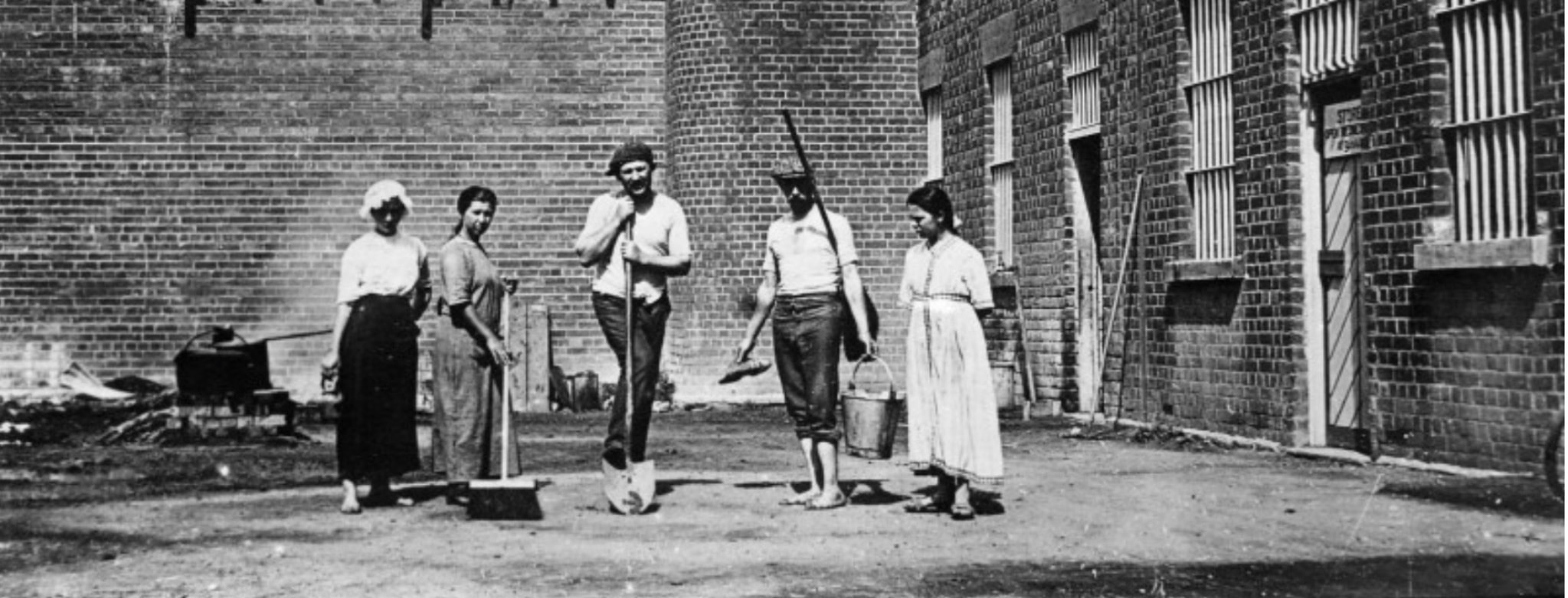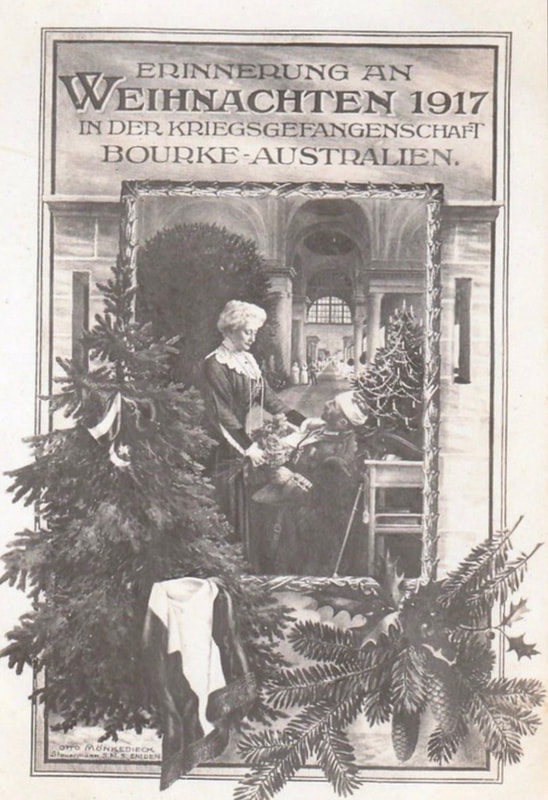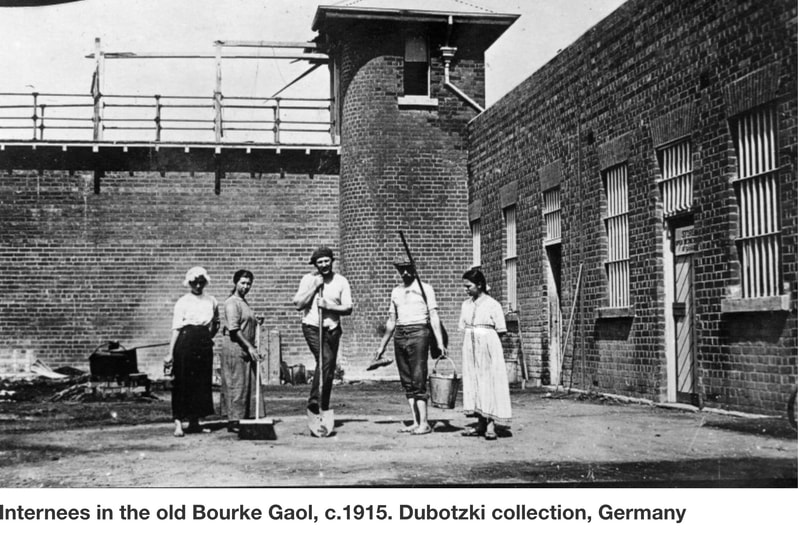|
I was recently writing a piece for The Western Herald in Bourke when I stumbled onto a century-old Christmas postcard that whispered a remarkable story. Unlikely as it may seem, the card links Australia’s most famous naval engagement to its most inland port. I’ll try to piece a narrative together from the fragments that remain. When war was declared in 1914, the 33,000 people of German origin living in Australia were forbidden to leave the country without a permit and ordered to report to police. Many of them were Lutheran Christians who had originally migrated seeking religious freedom and created hard-working farming communities in South Australia’s Barossa Valley. As the casualty lists from Gallipoli lengthened during 1915 and anti-German feelings grew more intense, the Great War came home to remote outback Bourke. German civilian prisoners of war were shipped to Australia from Singapore, Ceylon, Borneo, New Caledonia, Fiji, New Guinea and the Solomon Islands. A hundred or so were deposited in empty houses in the town. During the 1980’s I had the chance to interview a number of old Bourke residents who had vivid childhood memories of the ‘enemy aliens’ who made their hometown a POW camp.
“...When they were getting off the train, the soldiers were there with their bayonets... they marched them down to the old gaol.” John McGirr. “Oh, I remember 'em alright, with their white suits on, their walking sticks and white helmets...they used to parade up and down like the Army...we kids hung around 'em fascinated I suppose.” Jack Chapman. “...Most of them were professional men, no soldiers...doctors, dentists, bankers - well educated.” John McGirr. “Some of the local drunks might have been slinging off about them being Huns and Square-heads...that might have caused some righteous behaviour - a bit of knuckling up!” Jim Waters. “The children went to school...there was no resentment. They went to the picture shows and to the different sports. They'd go dancing, but stick to their own groups...' John McGirr. “We regret to learn that several townspeople attended a function held by the interned Huns...Surely our people are thoughtless when they accept the hospitality from the representatives of the most degraded race on earth!” Western Herald 29th Dec. 1917 “My parents told me they seemed to be well-received because some of the older people were very kind, good to people in sickness.” Jim Waters. “I am neither a German nor a prisoner, but an Australian woman! ... My first week in Bourke was hell on Earth…I washed my babies under a tap in the back yard and cooked on four bricks and an iron bar in the back yard with the temperature about 110 degrees in the shade. Those people who had money simply bought all they wanted...but those like myself who had none had to borrow enough to get some food fit for the children. I tried to wire my father from Bourke but I was not allowed; had it not been for the generosity of some of the German internees my sister and I would probably not be alive today!” Daisy Mildred Schoeffel, Australian wife of a German planter in Fiji, interned for two years. “The German concentration camp at Bourke has been broken up, and the Huns left for the Canberra district on Sunday last.” Western Herald 29th May 1918. The Christmas card reads ‘REMEMBERING CHRISTMAS 1917 AS A PRISONER OF WAR. BOURKE – AUSTRALIA’. It is signed, Otto Monkedieck. Storeman. SMS Emden. The SMS Emden was the German light cruiser that in the early months of the war had terrorized shipping and ports all around the Indian Ocean. Seventy-eight Allied warships had pursued the raider until her brief but brilliant career was ended by HMAS Sydney in the Battle of Cocos Island on 9 November 1914. It was the first victory for the newly formed Australian Navy. Significantly, British newspapers publicised the fact that the Emden’s crew had treated their enemies humanely, and avoided unnecessary casualties. This made them admired and popular war heroes not only in Germany, but also in Great Britain. (Christopher Miskimon, Warfare History Network, July 2018.) Otto must have been among wounded crew members who were shipped to Australia. I’ve studied his unusual card to understand why it celebrates Christmas with the image of a wounded German soldier on bended knee, laying his sword aside to present a bouquet to a kindly nurse who wears a cross. It gave me the feeling that, if Otto Monkedieck was the artist, he had brought the spirit of chivalry with him to Australia. It suggests perhaps, Christmas might have stirred hopes for peace, love and restoration in the heart of a lonely captive, a long way from home. Jesus’ willingness to resist the aggressive demands of Empire and to call men to have the courage to be peacemakers was the original badge of chivalry. This was certainly the case at Christmas 1914 in the slaughterhouse of the Western Front, when the singing of carols in German, English and French prompted foot-soldiers on both sides to defy orders, declare a brief armistice and to climb out of the trenches to shake hands as brothers in No Man’s Land. I tried casting my mind back to the dusty streets of Bourke on Christmas Eve 1917, to picture local folk heading to church on foot or in horse-drawn vehicles. I imagine them pausing to listen to the voices of Otto and other ‘enemy aliens’ singing the familiar carol written by Austrian priest Joseph Mohr, “Stille nacht, heilige nacht, Alles schlaft; einsam wacht”. He’d written Silent Night in the aftermath of the Napoleonic Wars that had decimated his country, to bring his poor parishioners hope. It’s a reminder to me that whatever their race and language, as long as men and women of faith truly celebrate Christmas, chivalry is not dead.
3 Comments
Geoffrey Bullock
12/24/2023 08:47:18 am
Well put, Paul!
Reply
Bronwyn
12/30/2023 10:30:43 am
I was reading a book in September , based on this, called "Interned ". Great to see your investigation and thoughts around this part of history.
Reply
Colin
1/29/2024 12:29:32 am
I have always felt the injustice of official treatment of European Australians during war as they were not respobsible for political decisions in their birth country..
Reply
Leave a Reply. |
AuthorJoin The Outback Historian, Paul Roe, on an unforgettable journey into Australia's Past as he follows the footprints of the Master Storyteller and uncovers unknown treasures of the nation. Archives
October 2023
Categories
All
|
|
Sponsored by
|
Privacy Policy
|
|
Copyright 2020 by The Outback Historian
|
Site powered by ABRACADABRA Learning
|




 RSS Feed
RSS Feed

